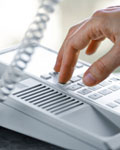Emergency Dental Care: Frequently Asked Questions

Q. What are some examples of dental care emergencies?
A. Some examples of dentistry emergencies are avulsed teeth, extruded teeth, broken teeth, a bitten tongue or lip, objects that are caught between teeth, toothaches, and possible broken jaw.
Q. What are avulsed teeth?
A. Avulsed teeth are teeth that are knocked out.
Q. What should you do if your tooth is knocked out?
A. If your tooth is knocked out you should carefully rinse the tooth with water. You should attempt to place the tooth back in its socket and secure it with a wet wrap. If you can not place the tooth back in its socket, put it in a glass with either saliva or milk. Then you should contact your dentist immediately.
Q. What are extruded teeth?
A. Extruded teeth are teeth that are forced out of position.
Q. What should you do if your tooth is pushed out of position?
A. If your tooth is pushed out of place you should reposition it to its normal alignment using very light finger pressure. You should hold the tooth in place with a moist gauze or tissue. Make sure that a dentist sees you within a half an hour.
Q. What do you do when you have a toothache?
A. When you have a toothache, you should clean your mouth by rinsing with warm water and remove any food that is trapped between teeth by flossing. Do not apply aspirin on the aching tooth or gum tissues. See your dentist as soon as possible.
Q. What do you do if you have something caught between your teeth
A. If you have an object caught between your teeth you should try to remove it with dental floss gently. Sometimes it helps to double up the floss. Do not attempt to remove the object with a sharp or pointed device. If you can not still can not remove the object, see your dentist.
Q. How would you treat a bitten tongue or lip?
A. To treat a bitten tongue or lip you should gently clean the area with a cloth and apply cold compresses to reduce swelling. If the bleeding continues, go to the hospital emergency room.
Q. Why do we brush our teeth?
A. We brush our teeth to remove bacteria and left over food particles from the mouth.
Q. How long should you brush your teeth?
A. You should brush your teeth twice a day for at least two to three minutes (until they are clean!).
Q. What can you do to slow down acid production when you ca't brush your teeth?
A. If you ca't brush your teeth you can rinse your mouth with water after a meal or snack to reduce acid reproduction by 30%. Wiping your teeth with a napkin is also a temporary measure until you can brush your teeth. Chewing sugar free gum helps, too.
Q. What is tooth bleaching?
A. Tooth bleaching or whitening is the process of lightening stains or discoloration of your teeth.
Q. What is involved in tooth bleaching?
A. Your dentist will determine which bleaching method is right for you. They will either use an in-office bleaching system or laser bleaching during your dental visit. But, most patients choose dentist-at-home-supervised bleaching. This method involves a custom-made mouth guard for the patient along with bleaching materials. You will be given instructions on how to wear the mouth guard and this type of method generally required ten to fourteen days to complete.
Q. How does tooth bleaching work?
A. Tooth bleaching whitens the teeth when the active whitening agent, carbamide peroxide, contacts water and hydrogen peroxide is released.
Q. Is tooth bleaching safe?
A. Studies have proven bleaching to be safe and effective. Bleaching does not soften, demineralize, or weaken the teeth.
Q. What are digitized X-rays?
A. A digitized X-ray is a computerized technology that allows a small sensor placed inside the patient's mouth to take the X-ray and instantly display it on a computer screen for the dentist to review.
How Pregnancy Affects Your Dental Care

Thinking about your baby and prenatal care is normal during pregnancy; however, thinking about your oral health and dental care may not be forefront on your mind, but dentistry is still very important. Women need to pay special attention to their teeth and gums especially during pregnancy to avoid the increased risk of dental problems.
Your Changing Body and Changing Dental Care Needs During Pregnancy.
Pregnancy brings a change in oral health and hormones, especially increased levels of estrogen and progesterone, which are linked to plaque buildup on teeth. Plaque that is not removed can cause gingivitis and swollen gums that are tender and prone to bleed. Most pregnant women experience gingivitis to some degree, but it doesn't usually surface until the second trimester.
If you had gingivitis before becoming pregnant, your condition will likely be aggravated; untreated gingivitis can lead to a more serious problem -- periodontal disease. Swollen gums that become irritated can also lead to pregnancy tumors, benign growths that will usually shrink and disappear without treatment. However, if the tumor causes discomfort or interferes with chewing or brushing, the dentist may suggest removing it.
Special Preventive Dental Care Tips for Pregnant Women
- Brush at least twice a day with fluoride toothpaste and after each meal, if possible.
- If brushing your teeth causes morning sickness, rinse with anti-plaque and fluoride mouthwashes or water.
- Pay close attention to your gum line and keep it clean.
- Floss daily.
- Focus on nutrition, including plenty of vitamins C and B12.
- Visit your dentist for a check-up and cleaning in both your first and second trimesters to control plaque and maintain good oral health.
Handling Dental Care Emergencies During Pregnancy
If you experience dental emergencies causing pain, you can be treated at any time; however, consult your doctor if anesthesia is required or a medication is prescribed to you. Avoid X-rays during pregnancy, unless they are critical to emergency treatment.
It is recommended to schedule elective procedures after your baby's birth. While you're expecting, have great expectations for maintaining good oral health. By doing so, you'll keep your beautiful smile and share it with your baby!
By Brian J. Gray, DDS, MAGD, FICO

+Jim Du Molin is a leading Internet search expert helping individuals and families connect with the right dentist in their area. Visit his author page.




